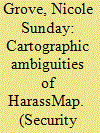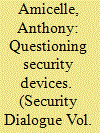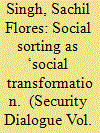|
|
|
Sort Order |
|
|
|
Items / Page
|
|
|
|
|
|
|
| Srl | Item |
| 1 |
ID:
140514


|
|
|
|
|
| Summary/Abstract |
In December 2010, HarassMap was launched as a Cairo-based interactive online mapping interface for reporting and mapping incidents of sexual harassment anonymously and in real time, in Egypt. The project’s use of spatial information technologies for crowdmapping sexual harassment raises important questions about the use of crowdsourced mapping as a technique of global human security governance, as well as the techno-politics of interpreting and representing spaces of gendered security and insecurity in Egypt’s urban streetscape. By recoding Egypt’s urban landscape into spaces subordinated to the visual cartography of the project’s crowdsourced data, HarassMap obscures the complex assemblage that it draws together as the differentially open space of the Egyptian street – spaces that are territorialized and deterritorialized for authoritarian control, state violence, revolt, rape, new solidarities, gender reversals, sectarian tensions, and class-based mobilization. What is at stake in my analysis is the plasticity of victimage: to what extent can attempts to ‘empower’ women be pursued at the microlevel without amplifying the similarly imperial techniques of objectifying them as resources used to justify other forms of state violence? The question requires taking seriously the practices of mapping and targeting as an interface for securing public space.
|
|
|
|
|
|
|
|
|
|
|
|
|
|
|
|
| 2 |
ID:
140512


|
|
|
|
|
| Summary/Abstract |
This article critically interrogates how borders are produced by scientists, engineers and security experts in advance of the deployment of technical devices they develop. We trace how sovereign decisions are enacted as assemblages in the antecedent register of device development through the everyday decisions of scientists and engineers in the laboratory, the security experts they engage, and the material components of the device itself. Drawing on in-depth interviews, observations, and ethnographic research of the EU-funded Handhold project, we explore how assumptions about the way security technologies will and should perform at the border shape the development of a portable, integrated device to detect chemical, biological, radiological, nuclear and explosives (CBRNE) threats at borders. In disaggregating the moments of sovereign decision-making across multiple sites and times, we question the supposed linearity of how science comes out of and feeds back into the world of border security. An interrogation of competing assumptions and understandings of security threats and needs, of competing logics of innovation and pragmatism, of the demands of differentiated temporalities in detection and identification, and of the presumed capacities, behaviours, and needs of phantasmic competitors and end-users reveals a complex, circulating and co-constitutive process of device development that laboratises the border itself.
|
|
|
|
|
|
|
|
|
|
|
|
|
|
|
|
| 3 |
ID:
140513


|
|
|
|
|
| Summary/Abstract |
What concepts such as ‘security’ and ‘privacy’ mean in practice is not merely a matter of policy choices or value concepts, but is inherently tied up with the socio-material and technological arrangement of the practices in which they come to matter. In this article, one trajectory in the implementation of a security regime into the sociotechnical arrangement of airport security checking is reconstructed. During this trajectory, gradual modifications or ‘translations’ are performed on what are initially defined as the privacy and security problems. The notion of translation is used to capture the modifications that concepts undergo between different stages of the process: the initial security problem shifts, transforms and comes to be aligned with several other interests and values. We articulate how such translations take place in the material realm, where seemingly technical and natural-scientific givens take part in the negotiations. On the one hand, these negotiations may produce technologies that perform social inequalities. On the other hand, it is in this material realm that translations of problem definitions appear as simply technical issues, exempted from democratic governance. The forms of privacy and security that emerge in the end are thus specific versions with specific social effects, which do not follow in an obvious way from the generic, initial concepts. By focusing on problem definitions and their translations at various stages of the development, we explain how it is possible for potentially stigmatizing and privacy-encroaching effects to occur, even though the security technologies were introduced exactly to preclude those effects.
|
|
|
|
|
|
|
|
|
|
|
|
|
|
|
|
| 4 |
ID:
140516


|
|
|
|
|
| Summary/Abstract |
Mobile technologies have brought about major changes in police equipment and police work. If a utopian narrative remains strongly linked to the adoption of new technologies, often formulated as ‘magic bullets’ to real occupational problems, there are important tensions between their ‘imagined’ outcomes and the (unexpected) effects that accompany their daily ‘practical’ use by police officers. This article offers an analysis of police officers’ perceptions and interactions with security devices. In so doing, it develops a conceptual typology of strategies for coping with new technology inspired by Le Bourhis and Lascoumes: challenging, neutralizing and diverting. To that purpose, we adopt an ethnographic approach that focuses on the discourses, practices and actions of police officers in relation to three security devices: the mobile digital terminal, the mobile phone and the body camera. Based on a case study of a North American municipal police department, the article addresses how these technological devices are perceived and experienced by police officers on the beat.
|
|
|
|
|
|
|
|
|
|
|
|
|
|
|
|
| 5 |
ID:
140511


|
|
|
|
|
| Summary/Abstract |
Algorithms, biometrics and body scanners, computers and databases, infrastructures of various kinds, ranging from what is commonly referred to as ‘hi-tech’ to ‘low-tech’ items such as walls or paper files, have garnered increased attention in critical approaches to (in)security. This article introduces a special issue whose contributions aim to further these approaches by questioning the role and political effects of security devices. It proposes an analytics of devices to examine the configuration and reconfiguration of security practices by attending to the equipment or instrumentation that make these practices possible and temporally stabilize them. The aim here is not to advance devices as a new unit of analysis, but to open new forays in ongoing debates about security politics and practices, by asking different research questions and developing new research angles. We start by outlining what is at stake when thinking of and analysing security practices through devices, or shifting from the language of technology and ‘technologies of security’ to security devices. The remainder of the article then specifies how an analytics of devices involves a more varied vocabulary of performativity, on the one hand, and agency, on the other.
|
|
|
|
|
|
|
|
|
|
|
|
|
|
|
|
| 6 |
ID:
140515


|
|
|
|
|
| Summary/Abstract |
In this article, I show that credit scoring, although not explicitly designed as a security device, enacts (in)security in South Africa. By paying attention to a brief history of state-implemented social categories, we see how the dawn of political democracy in 1994 marked an embrace of – not opposition to – their inheritance by the African National Congress. The argument is placed within a theoretical framework that dovetails David Lyon’s popularization of ‘social sorting’ with an extension of Harold Wolpe’s understanding of apartheid and capitalism. This bridging between Lyon and Wolpe is developed to advance the view that apartheid is a social condition whose historical social categories of rule have been reproduced since 1994 in the framing of credit legislation, policy and scoring. These categories are framed in the ‘new’ South Africa as indicators of ‘social transformation’. Through the lens of credit scoring, in particular, it is demonstrated that ‘social transformation’ not only influences, shapes and reproduces historical forms of social categories, but also serves the state’s attempt to create and maintain populations as risks.
|
|
|
|
|
|
|
|
|
|
|
|
|
|
|
|
|
|
|
|
|